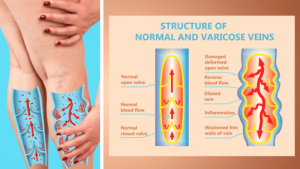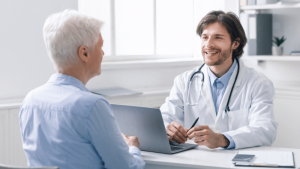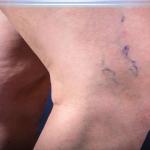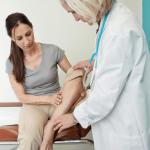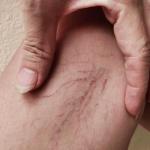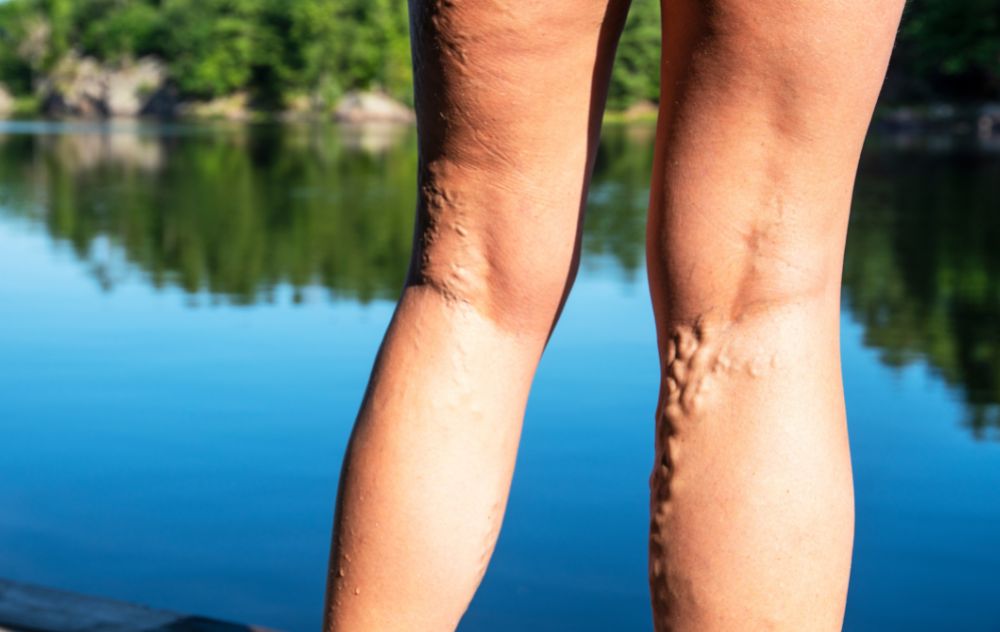
Varicose veins—twisted, bulging veins on the legs, ankles and feet—may appear to improve at times, but varicose veins rarely go away without medical treatment.
In most cases, they are a visible sign of chronic venous insufficiency (CVI), a progressive condition where blood doesn’t flow properly back to the heart. While symptoms like swelling or discomfort may come and go, the underlying vein damage typically persists and may worsen over time. Understanding why varicose veins don’t resolve naturally can help you determine when to consult a vein specialist and explore effective treatment options.
Take the Vein Quiz to Assess Your Symptoms
Can Varicose Veins Disappear on Their Own Naturally?
Although symptoms may temporarily improve, varicose veins won’t naturally disappear on their own. Because they’re usually linked to chronic venous insufficiency (CVI), the condition may silently progress, even if the discomfort subsides.
Waiting for them to disappear on their own can worsen your symptoms and lead to more serious complications like skin changes or ulcers. That’s why early diagnosis and treatment are so important.
Do Veins Repair Themselves?
The body can’t naturally repair veins once they become damaged. Varicose veins form when the valves inside the veins fail to close correctly. As a result, blood then flows backward and pools in the legs. This increased pressure causes the veins to bulge beneath the skin.
Several factors can contribute to valve damage and varicose vein formation, including genetics, aging, obesity, and prolonged periods of standing or sitting.
What are the Symptoms of Varicose Veins?
Varicose veins’ symptoms can stop you from living a healthy, active lifestyle.
Common symptoms include:
- Throbbing or aching pain
- Swelling in the lower legs
- Restlessness or heaviness
- Itching or skin changes
- Numbness or tingling
These symptoms indicate you may have early-stage chronic venous insufficiency. If left unaddressed, circulation can worsen over time and increase the risk of venous ulcers, deep vein thrombosis (DVT), and pulmonary embolism.
Can Varicose Veins Go Away after Pregnancy?
Many women develop varicose veins during pregnancy due to the increased blood volume and hormonal changes.
While some women may experience significant improvement or complete resolution of varicose veins after pregnancy, others may still have persistent varicose veins, depending on genetic factors, the number of previous pregnancies, and the severity of varicose veins during pregnancy.
What Happens if You Don’t Fix Varicose Veins?
Leaving varicose veins untreated can lead to serious complications such as venous ulcers, skin discoloration, and even blood clots. As vein function deteriorates, symptoms such as leg pain, swelling, and fatigue can become more severe, making it harder to perform daily activities. Early intervention is crucial in preventing these complications and helping varicose veins resolve.
Signs Your Varicose Veins Are Getting Worse
Varicose veins often progress gradually, but certain symptoms can indicate the progression of the underlying condition, chronic venous insufficiency (CVI).
Your varicose veins may be getting worse if you notice:
- Increasing leg pain or discomfort
- Persistent swelling or heaviness, especially after standing or sitting for long periods
- Skin discoloration around the ankles or lower legs
- Thickening or hardening of the skin (lipodermatosclerosis)
- Slow-healing wounds
If you have any of these symptoms and are wondering how to fix varicose veins, you may want to consider consulting a vein specialist to discuss treatment options.
Vein Treatments That Help Varicose Veins Go Away
If you want varicose veins to go away, USA Vein Clinics can help. Our clinic offers a range of FDA-approved, minimally invasive procedures to treat damaged veins and promote healthy circulation.
Non-surgical vein treatment options include:
- Endovenous Laser Therapy (EVLT)
- Ultrasound-Guided Sclerotherapy
- Visual Sclerotherapy
- ClariVein®
- Varithena®
- VenaSeal™
- Radiofrequency Ablation (RFA)
These outpatient procedures provide safe and effective relief with minimal downtime and lower risks compared to surgical treatments. During the initial consultation, our vein specialist will evaluate your symptoms, provide an accurate diagnosis, and discuss treatment options to determine the best one for your needs.
Explore Vein Treatment Options
Can Lifestyle Changes Get Rid of Varicose Veins?
Some lifestyle changes can help alleviate discomfort from varicose veins, but they do not address or reverse the underlying vein damage. These are some ways to help relieve unwanted varicose vein symptoms before treatment and prevent new varicose veins from forming:
- Elevating your legs, especially after long periods of standing or sitting, can reduce swelling.
- Wearing medical-grade compression stockings supports circulation and aids healing after vein treatment.
- Regular walking or low-impact exercises, such as swimming or cycling, can improve circulation and support vein health.
While these methods relieve symptoms, they do not heal or fix the damaged veins. Medical treatment is typically necessary to eliminate varicose veins in the long term.
How To Stop Varicose Veins From Getting Worse
Don’t wait for varicose veins to get worse. Early intervention and treatment can prevent long-term damage and help you heal your varicose veins. Many patients experience relief from pain, improved mobility, and greater confidence in the appearance of their legs after treatment.
Most of USA Vein Clinics’ treatments are covered by insurance, making effective care more accessible for patients. Schedule a consultation today and take the first step toward healthier legs.
Call Now to Book Your Consultation
Healing Varicose Veins FAQs
Can Varicose Veins Come Back After Treatment?
Varicose veins can recur after treatment, but their likelihood depends on the initial cause, the method used for treatment (surgery vs. minimally invasive options), the severity, and the commitment to lifestyle modifications.
How Long Does it Take to See Results from Vein Treatment?
The time it takes to see results from vein treatments depends on the type of procedure, the severity of the vein damage, and the individual’s response. Generally, noticeable improvements occur within a few weeks to several months.
Is There an Age When Varicose Veins Usually Start?
Varicose veins can develop at any age, but they are more common after the age of 40, particularly in women. In some cases, they may appear earlier, with some individuals beginning to notice varicose veins in their 20s or 30s, often due to genetic factors, prolonged standing, excess weight, or hormonal changes associated with pregnancy.

